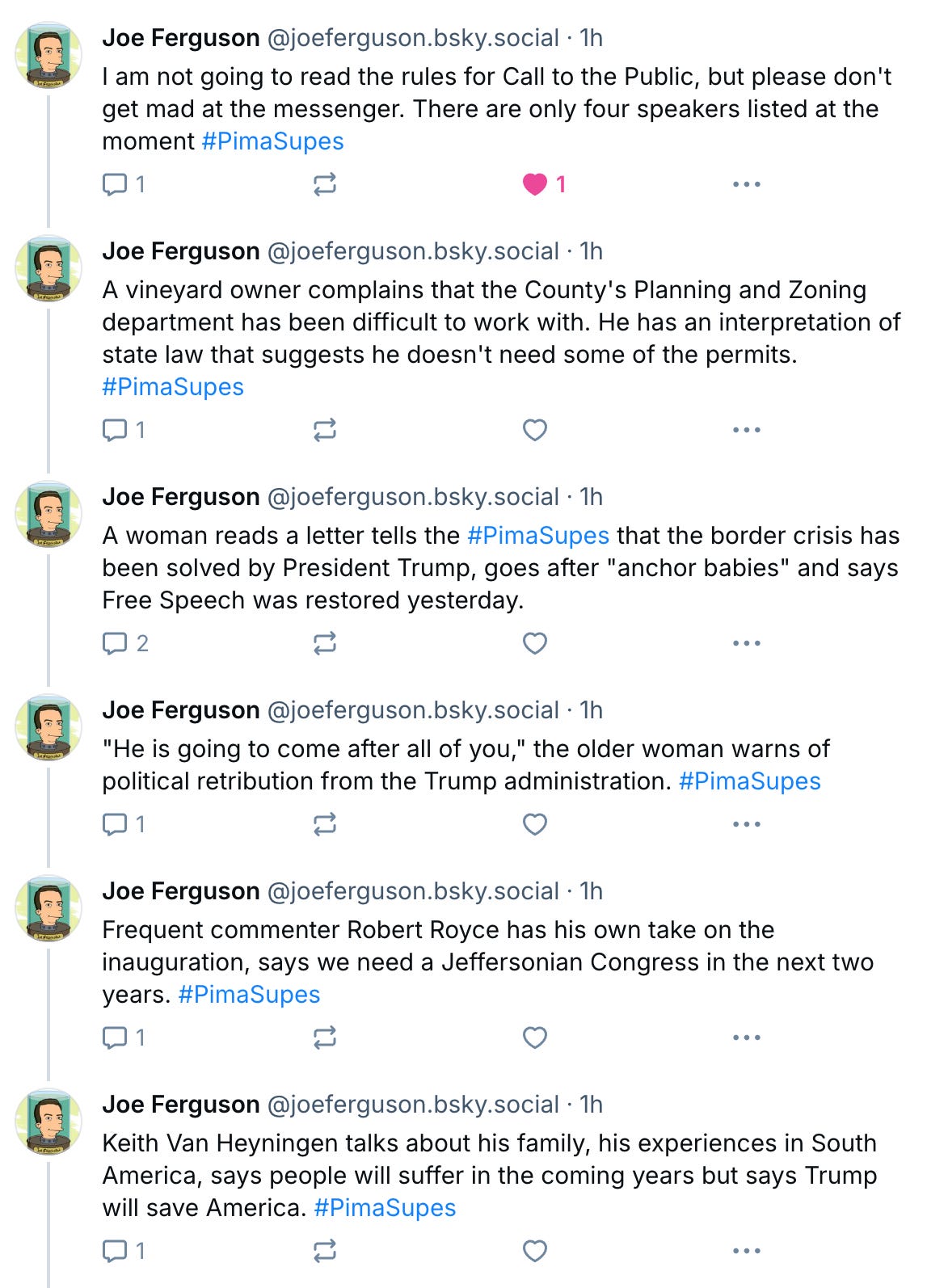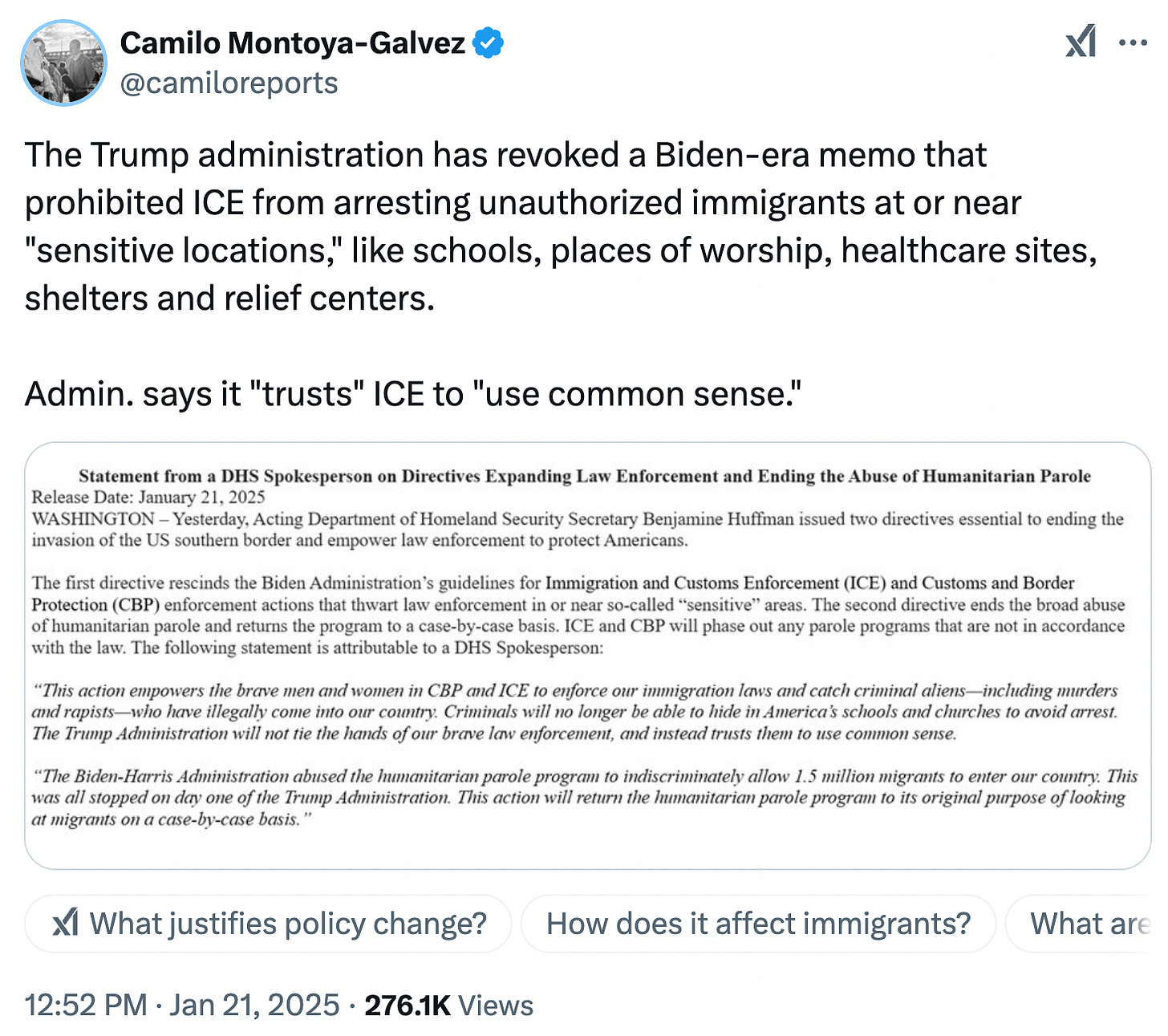Election (law) nightmares
“Wildly successful” at triggering Christy … It’s a city problem … And say hello to Mr. Chair.
When asked what keeps her up at night, Pima County Elections Director Constance Hargrove said it was the state Legislature.
“There are a lot of election bills and some of them have competing priorities trying to get early ballots turned in sooner,” she said after the Pima County of Supervisors meeting yesterday. “That changes what the recorder has to do, it affects whether early voting extends to 7 p.m. Monday night.”
The Monday night deadline for early voting could prove to be a sizable hurdle for the County Elections department, which generally uses the night before election day to set up and test equipment.
Following the day-to-day changes to that legislation, as well as a slew of other voting-related bills in the statehouse, is incredibly stressful, as she and Pima County Recorder Gabriella Cázares-Kelly look ahead to how they’d have to adapt new laws.
If Pima County officials have a hard time keeping track of bills, they should subscribe to Skywolf, our legislation-tracking service. Paid subscribers can check out our Tucson lawmaker tracking list at the bottom of this email.
Hargrove’s comments came after giving a report to the Pima County Board of Supervisors on Tuesday, outlining how Pima County handled the 2024 election.
Supervisor Steve Christy saved his ire for Cázares-Kelly. He seemed to be upset that she called the 2024 election “wildly successful” in her final report. The former auto dealer said it reminded him of the good ole days of slick car salesmen.
“Quite frankly, it reminded me of when I was selling cars and it was new car introduction month from Chrysler and we’d get PR and advertisement packets,” Christy said, re-litigating his complaints about the county recorder from last year.
Those past critiques include a delay in ballots going out to voters, a lack of outside observers during early voting, and closing the voter registration portal early — implying voter disenfranchisement.
"If there is one person not receiving their ballot, that is one too many," Christy told Cázares-Kelly.
Cázares-Kelly also is taking some heat from Republican lawmakers. In December, Reps. Rachel Keshel and Teresa Martinez asked Arizona Attorney General Kris Mayes to investigate Cázares-Kelly and how she handled the 2024 election.
Cázares-Kelly was ready for each of Christy’s criticisms, saying she has spoken at length both before the board and in public, defending the decisions she made in a tough election year. She also sent the board a copy of a release she put out months ago about the registration portal.
“It is a three-page media release that goes into the very exact details regarding the portal situation, which I went into extreme detail in a previous meeting,” she said.
Looking to the future, Cázares-Kelly is considering placing unmanned ballot drop-off locations in Pima County for the next election to better serve rural voters, but said they are usually co-located at county-owned facilities.
She wants to put one somewhere on the Tohono O'odham Nation, but notes it will take some out-of-the-box thinking as the county does not have facilities on tribal land.
Elsewhere at yesterday’s meeting, county residents took the mic to give officials a piece of their mind. Joe was there as call-to-the-public unfolded, posting the juiciest bits on Bluesky.
Like Joe’s live posts? Follow him on Bluesky and get a second helping today when he goes to the Tucson City Council this afternoon.
A regional effort, but a city problem: Jenifer Darland, the director of the county’s Office of Housing Opportunities and Homeless Solutions, told the Supervisors on Tuesday that the vast majority of the roughly 2,000 local homeless encampments are within the Tucson city limits. Just 15 percent were outside Tucson.
Pima County works closely with regional partners to deal with homelessness in collaborative fashion, and the Tucson City Council is set to address the issue at their meeting this evening.
Revisiting fire prevention after LA fires: Christy also took time in the meeting to talk about the wildfires in California. He encouraged more neighborhoods in Pima County to adopt the Firewise certification, noting several Green Valley communities are better prepared for wildfires.
Last year, Christy brought up complaints from county residents, particularly those in the Mount Lemmon area, who said they were getting denied for wildfire insurance. A total of 14 communities in Pima County currently have the certification, including Mount Lemmon.
Bueller? Bueller? Newly elected Supervisor Jen Allen didn’t attend the meeting on Tuesday. (It turns out, Allen’s 13-year-old dog died and she was grieving)
Unlike your public officials, we’re here for you every Monday through Friday. But we can’t just tax you for our services. Click the button to support local, independent news.
House Bill 2099: governor; attorney general; duties; immigration
Sponsor: Republican Rep. Teresa Martinez from Legislative District 16 in Pinal County.
Summary: Requires the governor and the attorney general to enforce, administer, and cooperate with federal actions, orders, and programs related to the enforcement of federal immigration laws.
Upcoming: The bill is scheduled to get a hearing at Wednesday’s meeting of the House Government Committee, which includes Tucson-area Reps. Stephanie Stahl Hamilton and Betty Villegas.
Notes: Lawmakers are considering the bill while President Donald Trump prepares a wide-ranging crackdown on immigration and the refugee resettlement system. Previous presidents, including Trump during his first term, have leaned on local and state officials to help detain immigrants who don’t have the proper paperwork. This time around, Trump administration officials say they plan to detain people in schools and churches, which have been safe havens for immigrants in Tucson.
What do you think? Let the lawmakers on the House Government Committee know how you feel about HB2099 with Wolfpack, our email-generating tool.
The Day After: With the stroke of a pen, Trump signed 10 executive orders on Monday, including one that ended the sole way to seek asylum at the U.S-Mexico border, the Arizona Daily Star’s Emily Bregel writes. By turning off the phone-based “CBP One” app, asylum seekers waiting in Mexico no longer have any way of securing an appointment, leaving nearby shelters scrambling for resources. The order canceled an estimated 300,000 appointments for people who had been waiting up to a year.
One more night under the stars: The Tucson Sentinel’s Paul Ingram brings the story (and photos) of 18 migrants seeking asylum being taken into custody near Sasabe on Monday, during the final morning hours of the Biden Administration. Volunteers fed spicy ramen to migrants from Cameroon, Nigeria, and Mexico and kept them warm before the men, women and children were picked up by Border Patrol. Meanwhile, Ingram explains the complex history and political geography of the tiny town along the international border.
A new, terrible kind of homework: As Tucson-area schools brace for the possibility of mass deportations, Tucson Unified School District and other local schools have policies in place to protect students from being deported. But officials concede not every plan can cover every possible contingency, the Star’s Jessica Votipka writes. At the heart of the argument is a 1982 Supreme Court ruling in the case Plyler v. Doe, which states children not “legally admitted” still have a right to enroll in school.
Spying on UA Wildcats: A newly declassified document suggests a CIA operative visited the University of Arizona in 1969, writes the Arizona Luminaria’s John Washington. A heavily redacted two-page document confirms the university had a contract to closely monitor the Brown Berets, a Latino social justice organization, and Students for a Democratic Society for the federal agency during the 1960s.
In the rollercoaster world that is local municipal politics, setting the tone is important, especially when your meeting often lasts for several hours.
As the new chair of the Pima County Board of Supervisors, Supervisor Rex Scott offered to the room two ways to address him during the meeting.
“Since this is my first meeting as the chair, it is perfectly fine to address me as either as Mr. Chair, as both Mr. Christy and Mr. DeBonis has, or you can address me as the previous two chairs have asked to be addressed, which is my title and then my surname,” Scott told his colleagues.
We are leaning toward “Mr. Chair” but we’ll try them both out if one of us has to formally address the board.
No word on how residents will address him during the “call to the public” portion of the meeting, but the smart money is on other names.










Jen Allen's beloved dog of 13 years passed away yesterday morning, which is why she didn't attend the meeting.
I’ve heard some creative names used at Call to the Public, I doubt some of the folks will comply.